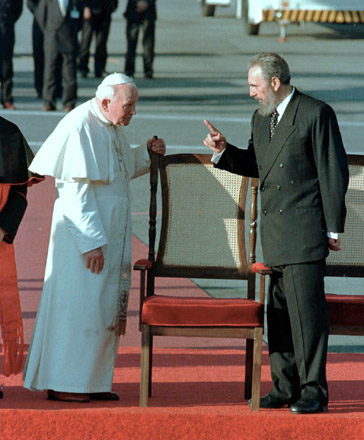
Atheist Fidel Castro lectures the Pope on the secular virtues of his Revolution…
Last week, President Bush surprised many of his fellow Methodists (well-known for their religious reserve) by paying tributes to Pope John Paul II with fundamentalist emotion and conviction. In fact, he even offered a zealous defense of the Pope when his new best buddy, Bill Clinton, said that “there will be debates about [the Pope’s legacy].” Bush countered that:
I think John Paul II will have a clear…and excellent legacy of peace, compassion and a strong legacy of setting a clear moral tone.
It is doubtful that any world leader has ever given a more convincing endorsement of the Pope’s moral authority. Therefore, one might expect Bush to be inspired to help fulfill the Pope’s legacy by honoring the clear moral tone he set for dealing with Cuba. Indeed, it is ironic that the Pope’s legacy is distinguished by the spiritual leadership he provided for lifting the iron curtain of communism over Eastern Europe; yet, it remains unfulfilled because successive U.S. Presidents have failed to heed his moral challenge to lift the embargo against Cuba.
Unfortunately, Bush’s political conversion on this policy seems unlikely. In fact, just last year, he actually intensified America’s unilateral embargo by restricting visits by Cuban émigrés to their families. Of course, Fidel Castro then felt compelled to retaliate and, therefore, banned the use of the U.S. dollar in Cuba. (A rash act for which the adage “cutting off one’s nose to spite one’s face” is entirely apt.)
But this tit for tat is only the latest exchange between Washington and Havana in more than four decades of bilateral tensions that have only brought suffering to the Cuban people and undermined U.S. strategic and economic interests in the Western Hemisphere.
Moreover, the embargo against Cuba stands as a glaring example of double standards in America’s foreign policy and an affront to the Christian principles that Bush professes to live by. Because, as Bush was tightening America’s squeeze on Cuba, he was simultaneously intensifying America’s courtship of China and Vietnam – two countries where human rights and religious freedoms are abused far more than they are in Cuba. (Indeed, how could a Christian President countenance denying the delivery of food, medicine and medical equipment to help poor children just to reinforce a political grudge?)
Long before he actually visited Cuba in 1998, the Pope decried America’s policy towards Cuba as “oppressive, unjust, and ethically unacceptable.” And, during that historic visit, he reiterated that:
…imposed isolation strikes the people indiscriminately, making it ever more difficult for the weakest to enjoy the bare essentials of decent living, things such as food, health and education.
Even as recently as last January, upon receiving the credentials of the new Cuban Ambassador to the Vatican, the Pope used more diplomatic language to restate his concerns as follows:
The Holy See strongly desires that obstacles which block free communication and exchange between the Cuban nation and part of the international community be overcome soon, thus reinforcing through respectful and open dialogue with everyone, the conditions necessary for real development.
It is noteworthy, however, that the Pope never granted Castro absolution for his dictatorship. Because he was equally unrelenting in his condemnation of Cuba’s human rights abuses, imprisonment of political dissidents and stifling of religious freedom.
Indeed, it is a testament of the Pope’s impartiality that one would be hard pressed to determine from his moral edicts on Cuba whether the American Presidents or Castro was the greater transgressor in his pontifical judgment.
But, demonstrating that he was not entirely averse to politics, the Pope also admonished Cuban Americans to seek reconciliation. He was clearly aware that these exiles, most of whom live in Miami, are primarily responsible for the irrational and uncompromising policy the U.S. has maintained towards Cuba for all these years. The Pope instructed them by saying that:
To the extent that they consider themselves Cubans, they, too, must cooperate, peacefully and in a constructive and respectful way, in the nation’s progress, avoiding useless confrontations and encouraging …dialogue.
Therefore, instead of merely extolling the Pope’s moral authority, President Bush should rise above political pandering and heed his call to end America’s inhumane and immoral embargo against Cuba. After all, when a communist dictator can claim papal sanction to dismiss the President of the United States as a hypocrite, this alone should cause a God-fearing president like George W. Bush to reexamine his policies, if not his soul.
Click here to read a sensible and humane proposal by U.S. Congressman Dennis Kucinich on how America can correct its misguided policy towards Cuba.
Click here for information on the origins and geopolitical impact of America’s embargo against Cuba.
News and Politics
Leave a Reply
You must be logged in to post a comment.